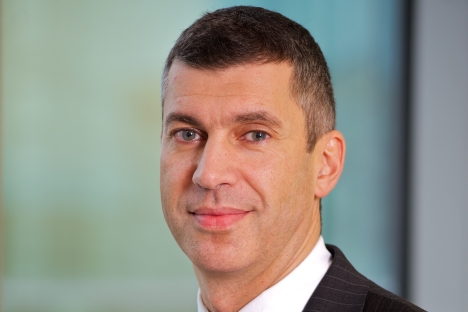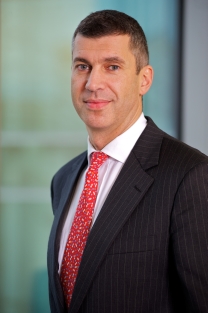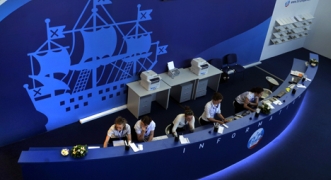Russia stands among Citi's priority markets

 |
| Citibank’s Director in Russia, Andrei Kurilin. Source: Press Photo |
Marina Maksimova: How important is Russia for Citibank?
Andrei Kurilin: Russia is among Citi’s priority markets, both in terms of performance and potential. In 2012 the revenue of ZAO Citibank, Citi's full Russian subsidiary, reached $1 billion last year, while its net income exceeded $300 million. To compare, Citigroup Inc., which operates in more than 100 countries, generated around $70 billion in revenue worldwide.
M.M.: We are witnessing the best period in the history of Russian Eurobonds – our country accounts for around a third of total issues in the CEEMEA (Central and Eastern Europe, Middle East, and Africa) region. Why such activity in the Eurobond market?
A.K.: First of all, there is strong demand from international investors for Russian corporate bonds; secondly, interest rates have never been more attractive, which encourages issuers to issue new bonds to replace older, more expensive issues; and finally, the global markets are flushed with cash as a result of the so-called quantitative easing.
M.M.: What’s your assessment of the Russian banking system?
A.K.: The Russian banking sector must be feeling O.K., as the assets, capitalization, and earnings of many banks continue to grow. It’s true that provisions have risen too, but it’s clear that non-payments are still within the expected range: Arrears do not exceed 5 percent on average in the industry.
Russia’s banking system is an emerging one, and many hope that the role of banks in the national economy, for example in long-term financing, will gradually become more important.
M.M.: What in your opinion is the optimum balance between retail and corporate business in Russia?
Related:
City authorities seek to turn Moscow into Russian Wall Street
A.K.: While we launched retail operations almost ten years after the corporate block, it already accounts for more than a third of Citi’s revenue in Russia. This segment continues to grow at a rapid pace, because there is serious demand in Russia for world-class banking services and products, especially from the middle class and high-net-worth individuals.
We are not targeting any specific ratio of retail and corporate revenues, although we believe that excessive exposure to any particular area of operations should be avoided.
For instance, our corporate arm serves both Russian divisions of major multinational corporations with strong brand awareness among our compatriots and large Russian companies from the natural resources, telecommunications, financial and other sectors. We serve most of our clients globally.
M.M.: What’s your assessment of Elvira Nabiullina’s appointment as head of the Central Bank? Do you expect any changes?
A.K.: The new Chairman of the Central Bank is widely respected in the market. The Russian banking community has welcomed her appointment. Everybody is counting on the rules of the game to remain predictable.
M.M.: The Russian government is dreaming about turning Moscow into an International Financial Center. Will it succeed?
A.K.: If the scale and quality of business activity are any indication, Moscow has already become a regional financial center. For it to become a global financial center, a lot has to be done in various areas, and also some time must pass. The legal framework, judicial practices, supervision and tax requirements must all be aligned with supporting and developing entrepreneurship, drawing on the best practices of other nations.
M.M.: The 17th International Economic Forum will take place in St. Petersburg in late June. What issues are you going to raise there?
A.K.: The St. Petersburg International Economic Forum is one of the world’s largest economic gatherings and one of the most anticipated business events in Russia.
The Forum provides an opportunity to meet with a large number of major partners in a short period of time and discuss a wide range of matters; that’s why many international business executives schedule meetings and sign contracts there.
For example, last year we signed a $140 million loan agreement with Russia’s largest shipping company, Sovcomflot. Citi has been represented by its CEO for four years. Formerly, it was Vikram Pandit, and this year our delegation will be led by the new Chief Executive, Mike Corbat, who, among other things, will speak on global financial sector reform at the forum.
M.M.: How seriously is the growing protest activity and the government’s response to it affecting the country’s image? Has it affected Western investors in terms of their interest in Russia?
A.K.: The international financiers invest their own and their clients’ money and therefore understand fairly well what is going on in the country. I believe the fact that there are some public demonstrations or various points of view is perceived as a normal thing.
Investors analyze a whole mix of indicators that shape their opinion about the relative appeal of a market or a business climate. Both in Russia and in other emerging markets they welcome all steps aimed at further improving the business environment.
Andrei Kurilin is a Chief Operating Officer of Citibank in Russia and Chairman of the Board of Directors of ZAO Citibank . He started his career at the bank as an associate in 1996. From
2003 until 2006, he managed Citi’s corporate business in Kazakhstan,
and between 2006 and 2008, he worked in Citi’s head office in New York
City. From 2008 until 2012, he was in charge of Citi’s risk management in Russia, Kazakhstan and Ukraine.
All rights reserved by Rossiyskaya Gazeta.
Subscribe
to our newsletter!
Get the week's best stories straight to your inbox
